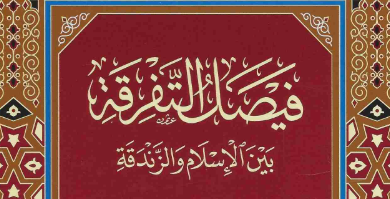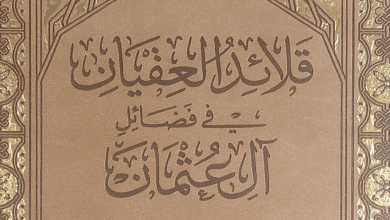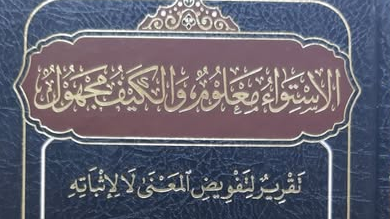Imām al-Nawawī (d. 676 AH) on Tafwīḍ and Ta’wīl of the Salaf and Khalaf
Imām Muḥyī al-Dīn Yaḥyā ibn Sharaf al-Nawawī (d. 676 AH/1277 CE), the renowned Shāfi’ī jurist and ḥadīth scholar, addressed one of the most significant theological debates in Islamic intellectual history: how to properly understand the scriptural texts that seemingly attribute physical qualities to Allah. This methodological question concerning the divine attributes (al-Sifāt) has divided scholars into two primary approaches.
The first approach, often associated with later scholars (Khalaf), advocates for figurative interpretation (ta’wīl) of these texts in a manner befitting divine transcendence (tanzih). The second approach, attributed to the early pious predecessors (Salaf), emphasizes refraining from delving into detailed interpretations while delegating the true knowledge of their meanings to Allah (tafwīḍ al ma’na), while simultaneously affirming divine transcendence beyond any anthropomorphic qualities.
Imām al-Nawawī, in his exposition on this matter, carefully outlines both methodologies while indicating that the way of the Salaf represents the safer path, as it avoids the potential risks of speculative interpretation where not absolutely necessary. However, he acknowledges that interpretation may sometimes be warranted when needed to refute innovations or misconceptions. His nuanced explanation reveals the sophisticated theological discourse that developed around these questions and demonstrates the careful balance maintained between affirming revelation and preserving divine transcendence.
Imam al-Nawawī said in his Sharḥ al-Muhadhdhab (1/25):
اخْتَلَفُوا فِي آيَاتِ الصِّفَاتِ وَأَخْبَارِهَا هَلْ يُخَاضُ فِيهَا بِالتَّأْوِيلِ أَمْ لَا فَقَالَ قَائِلُونَ تُتَأَوَّلُ عَلَى مَا يَلِيقُ بِهَا وَهَذَا أَشْهَرُ الْمَذْهَبَيْنِ لِلْمُتَكَلِّمِينَ: وَقَالَ آخَرُونَ لَا تُتَأَوَّلُ بَلْ يُمْسِكُ عَنْ الْكَلَامِ فِي مَعْنَاهَا وَيُوكَلُ عِلْمُهَا إلَى اللَّهِ تَعَالَى وَيَعْتَقِدُ مَعَ ذَلِكَ تَنْزِيهَ اللَّهِ تَعَالَى وَانْتِفَاءَ صِفَاتِ الْحَادِثِ عَنْهُ: فَيُقَالُ مَثَلًا نُؤْمِنُ بِأَنَّ الرَّحْمَنَ عَلَى الْعَرْشِ اسْتَوَى وَلَا نَعْلَمُ حَقِيقَةَ مَعْنَى ذَلِكَ وَالْمُرَادَ بِهِ مَعَ أَنَّا نَعْتَقِدُ أَنَّ اللَّهَ تَعَالَى (لَيْسَ كمثله شئ) وَأَنَّهُ مُنَزَّهٌ عَنْ الْحُلُولِ وَسِمَاتِ الْحُدُوثِ وَهَذِهِ طَرِيقَةُ السَّلَفِ أَوْ جَمَاهِيرِهِمْ وَهِيَ أَسْلَمُ إذْ لَا يُطَالَبُ الْإِنْسَانُ بِالْخَوْضِ فِي ذَلِكَ فَإِذَا اعْتَقَدَ التَّنْزِيهَ فَلَا حَاجَةَ إلَى الْخَوْضِ فِي ذَلِكَ وَالْمُخَاطَرَةِ فِيمَا لَا ضَرُورَةَ بَلْ لَا حَاجَةَ إلَيْهِ فَإِنْ دَعَتْ الْحَاجَةُ إلَى التَّأْوِيلِ لِرَدِّ مُبْتَدِعٍ وَنَحْوِهِ تَأَوَّلُوا حِينَئِذٍ: وَعَلَى هَذَا يُحْمَلُ مَا جَاءَ عَنْ الْعُلَمَاءِ فِي هَذَا والله أعلم
They differed regarding the verses of attributes and their reports: Should they be approached through interpretation [Ta’wīl] or not? Some say: They should be interpreted in a manner befitting them, and this is the more famous of the two positions among the theologians [mutakallimīn]. Others say: They should not be interpreted, rather one should refrain from discussing their meaning [ma’nā] and delegate their knowledge [‘ilm] to Allah the Exalted, while still affirming Allah’s transcendence and the absence of created attributes from Him. So it is said, for example: We believe that “the Most Merciful is established [istawā] over the Throne,” and we do not know the reality [ḥaqīqa] of the meaning [ma’nā] of this and what is intended by it, along with our belief that Allah the Exalted “there is nothing like unto Him” and that He is transcendent above indwelling [ḥulūl] and the characteristics of temporal origination. This is the approach of the early scholars [Salaf] or their majority, and it is the safest; as a person is not required to delve into such matters. If one believes in transcendence, there is no need to engage in such matters and risk what is neither necessary nor needed. However, if there is a need for interpretation [Ta’wīl] to refute an innovator or similar situation, they would interpret at that time. And based on this should be understood what has come from the scholars in this regard, and Allah knows best.
He also mentioned the following in his Al-Minhāj Sharḥ Ṣaḥīḥ Muslim ibn al-Ḥajjāj (5/24):
قَوْلُهُ ﷺ أَيْنَ اللَّهُ قَالَتْ فِي السَّمَاءِ قَالَ مَنْ أَنَا قَالَتْ أَنْتَ رَسُولُ اللَّهِ قَالَ أَعْتِقْهَا فَإِنَّهَا مُؤْمِنَةٌ هَذَا الْحَدِيثُ مِنْ أحَادِيثِ الصِّفَاتِ وَفِيهَا مَذْهَبَانِ تَقَدَّمَ ذِكْرُهُمَا مَرَّاتٍ فِي كِتَابِ الْإِيمَانِ أَحَدُهُمَا الْإِيمَانُ بِهِ مِنْ غَيْرِ خَوْضٍ فِي مَعْنَاهُ مَعَ اعْتِقَادِ أَنَّ اللَّهَ تَعَالَى لَيْسَ كَمِثْلِهِ شَيْءٌ وَتَنْزِيهِهِ عَنْ سِمَاتِ الْمَخْلُوقَاتِ وَالثَّانِي تَأْوِيلُهُ بِمَا يَلِيقُ بِهِ فَمَنْ قَالَ بِهَذَا قَالَ كَانَ الْمُرَادُ امْتِحَانَهَا هَلْ هِيَ مُوَحِّدَةٌ تُقِرُّ بِأَنَّ الْخَالِقَ الْمُدَبِّرَ الْفَعَّالَ هُوَ اللَّهُ وَحْدَهُ وَهُوَ الَّذِي إِذَا دَعَاهُ الدَّاعِي اسْتَقْبَلَ السَّمَاءَ كَمَا إِذَا صَلَّى الْمُصَلِّي اسْتَقْبَلَ الْكَعْبَةَ وَلَيْسَ ذَلِكَ لِأَنَّهُ مُنْحَصِرٌ فِي السَّمَاءِ كَمَا أَنَّهُ لَيْسَ مُنْحَصِرًا فِي جِهَةِ الْكَعْبَةِ بَلْ ذَلِكَ لِأَنَّ السَّمَاءَ قِبْلَةُ الدَّاعِينَ كَمَا أَنَّ الْكَعْبَةَ قِبْلَةُ الْمُصَلِّينَ أَوْ هِيَ مِنْ عَبَدَةِ الْأَوْثَانِ الْعَابِدِينَ لِلْأَوْثَانِ الَّتِي بَيْنَ أَيْدِيهِمْ فَلَمَّا قَالَتْ فِي السَّمَاءِ عَلِمَ أَنَّهَا مُوَحِّدَةٌ وَلَيْسَتْ عَابِدَةً لِلْأَوْثَانِ قَالَ الْقَاضِي عِيَاضٌ لَا خِلَافَ بَيْنَ الْمُسْلِمِينَ قَاطِبَةً فَقِيهُهُمْ وَمُحَدِّثُهُمْ وَمُتَكَلِّمُهُمْ وَنُظَّارُهُمْ وَمُقَلِّدُهُمْ أَنَّ الظَّوَاهِرَ الْوَارِدَةَ بِذِكْرِ اللَّهِ تَعَالَى فِي السَّمَاءِ كَقَوْلِهِ تَعَالَى أَأَمِنْتُمْ مَنْ فِي السماء أن يخسف بكم الأرض وَنَحْوِهِ لَيْسَتْ عَلَى ظَاهِرِهَا بَلْ مُتَأَوَّلَةٌ عِنْدَ جَمِيعِهِمْ فَمَنْ قَالَ بِإِثْبَاتِ جِهَةِ فَوْقُ مِنْ غَيْرِ تَحْدِيدٍ وَلَا تَكْيِيفٍ مِنَ الْمُحَدِّثِينَ وَالْفُقَهَاءِ وَالْمُتَكَلِّمِينَ تَأَوَّلَ فِي السَّمَاءِ
أَيْ عَلَى السَّمَاءِ وَمَنْ قَالَ مِنْ دَهْمَاءِ النُّظَّارِ وَالْمُتَكَلِّمِينَ وَأَصْحَابِ التَّنْزِيهِ بِنَفْيِ الْحَدِّ وَاسْتِحَالَةِ الْجِهَةِ فِي حَقِّهِ سبحانه وتعالى تَأَوَّلُوهَا تَأْوِيلَاتٍ بِحَسَبِ مُقْتَضَاهَا وَذَكَرَ نَحْوَ مَا سَبَقَ قَالَ وَيَا لَيْتَ شِعْرِي مَا الَّذِي جَمَعَ أَهْلَ السُّنَّةِ وَالْحَقِّ كُلَّهُمْ عَلَى وُجُوبِ الْإِمْسَاكِ عَنِ الْفِكْرِ فِي الذَّاتِ كَمَا أُمِرُوا وَسَكَتُوا لِحِيرَةِ الْعَقْلِ وَاتَّفَقُوا عَلَى تَحْرِيمِ التَّكْيِيفِ وَالتَّشْكِيلِ وَأَنَّ ذَلِكَ مِنْ وُقُوفِهِمْ وَإِمْسَاكِهِمْ غَيْرُ شَاكٍّ فِي الوجود والموجود وَغَيْرُ قَادِحٍ فِي التَّوْحِيدِ بَلْ هُوَ حَقِيقَتُهُ ثُمَّ تَسَامَحَ بَعْضُهُمْ بِإِثْبَاتِ الْجِهَةِ خَاشِيًا مِنْ مِثْلِ هَذَا التَّسَامُحِ وَهَلْ بَيْنَ التَّكْيِيفِ وَإِثْبَاتِ الْجِهَاتِ فَرْقٌ لَكِنْ إِطْلَاقُ مَا أَطْلَقَهُ الشَّرْعُ مِنْ أَنَّهُ الْقَاهِرُ فَوْقَ عِبَادِهِ وَأَنَّهُ اسْتَوَى عَلَى الْعَرْشِ مَعَ التَّمَسُّكِ بِالْآيَةِ الْجَامِعَةِ لِلتَّنْزِيهِ الْكُلِّيِّ الَّذِي لَا يَصِحُّ فِي الْمَعْقُولِ غَيْرُهُ وهو قوله تعالى ليس كمثله شيء عِصْمَةٌ لِمَنْ وَفَّقَهُ اللَّهُ تَعَالَى وَهَذَا كَلَامُ الْقَاضِي رَحِمَهُ اللَّهُ تَعَالَى
Regarding the Prophet’s ﷺ saying “Where is Allah?” She replied, “In the sky.” He asked, “Who am I?” She said, “You are the Messenger of Allah.” He said, “Free her, for she is a believer.” This hadith is among the hadiths of divine attributes [aḥādīth al-ṣifāt], and there are two approaches to them that have been mentioned repeatedly in the Book of Faith. The first is to believe in it without delving into its meaning [ma’nā] while affirming that Allah the Exalted is unlike anything and transcendent beyond the characteristics of created beings. The second is to interpret it [Ta’wīl] in a manner befitting Him.
Those who hold the second view say that the intent was to test whether she was a monotheist who acknowledges that the Creator, the Manager, the Doer is Allah alone, and He is the One whom, when a supplicant calls upon Him, faces toward the sky, just as when someone prays, they face the Ka’ba. This is not because He is confined to the sky, just as He is not confined to the direction of the Ka’ba. Rather, it is because the sky is the direction [qibla] for supplicants just as the Ka’ba is the direction for those who pray. Or perhaps she was among the idol worshippers who worshipped idols that were before them, and when she said “In the sky,” he knew she was a monotheist and not an idol worshipper.
Qāḍī ‘Iyāḍ said: “There is no disagreement among all Muslims—their jurists, hadith scholars, theologians, thinkers, and their followers—that the apparent texts mentioning Allah the Exalted being in the sky, such as His saying, ‘Do you feel secure that He who is in the sky would not cause the earth to swallow you,’ and similar verses, are not to be taken according to their apparent [ẓāhir] meaning, but are interpreted by all of them. Those among the hadith scholars, jurists, and theologians who affirm the direction of ‘above’ without specifying limits or modality interpret ‘in the sky’ to mean ‘above the sky.’ Those among the general theologians and proponents of transcendence who deny limits and consider direction impossible for Him, glory be to Him and exalted is He, interpret these texts in various ways according to their requirements,” and he mentioned similar to what was previously stated.
He said, “I wish I knew what has united all the people of Sunnah and truth on the obligation to refrain from thinking about the Divine Essence as they were commanded, remaining silent due to the perplexity of the intellect, and agreeing on prohibiting assigning modality [takyīf] and form, such that their stance and restraint does not doubt existence and the existent, nor detract from Divine Oneness [tawḥīd], but rather constitutes its reality. Then some of them were lenient in affirming direction, fearing from such leniency, but is there any difference between affirming modality and affirming directions? However, accepting what the Law has stated—that He is the Subjugator above His servants and that He is established [istawā] over the Throne—while adhering to the comprehensive verse of complete transcendence, which is the only rationally valid approach, namely His saying, exalted is He, ‘There is nothing like unto Him’—is protection for whomever Allah the Exalted grants success.” These are the words of the Qāḍī, may Allah the Exalted have mercy on him.
Compiled by:
Abul Hasan Hussain Ahmed






